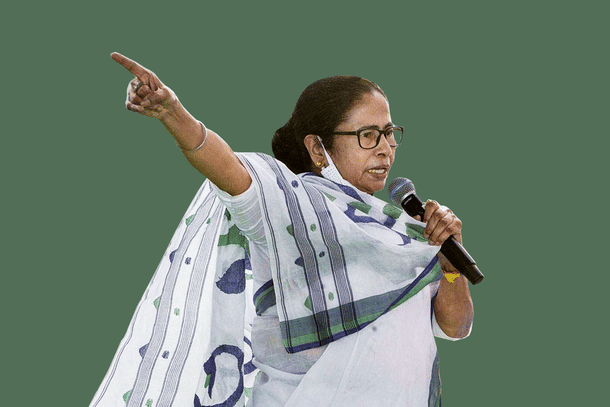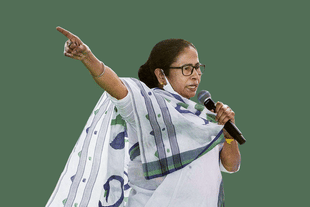Politics
Battleground Bengal: Trinamool Likely To Intimidate And Obstruct Opposition Party Cadre Even More
Jaideep Mazumdar
Apr 21, 2021, 02:35 PM | Updated 02:35 PM IST
Save & read from anywhere!
Bookmark stories for easy access on any device or the Swarajya app.


The last three phases of polling in Bengal for 112 seats on 22, 26 and 29 April are likely to see a sharp spike in violence as a desperate Trinamool makes a last-ditch attempt to retain what it considers are its South Bengal bastions.
For the Trinamool, these three phases are quite like the slog overs where it will try to intimidate opposition supporters and functionaries, warn reports prepared by internal intelligence agencies.
The Trinamool won 61 of the 112 seats, and considers many of the constituencies going to the polls in the last three phases as its strongholds.
The Trinamool leadership, it is learnt, feels that given the party’s poor performance in the first five phases of polling in the 180 seats, the party has to pull out all stops to drastically improve its 2016 tally.
But doing that through fair means will be impossible since the Trinamool has lost a lot of ground in all the areas that go to the polls over the next one week.
Hence, it has to deploy its muscle-power to win as many seats of the 112 as possible. However, the strong presence of central forces may not make it easy for the Trinamool to indulge in foul play on the days of polling.
Thus, according to reports prepared by intelligence agencies, the Trinamool is likely to escalate pre and post-poll violence in order to send a message to opposition functionaries and supporters.
In fact, there has been a sharp escalation in violence — attacks by Trinamool goons on opposition (primarily the BJP) cadres, leaders and supporters — immediately after the fifth round of polling on 17 April.
BJP cadres and supporters were attacked and assaulted, their houses ransacked and looted and dire warnings issued to countless people associated with the BJP after 17 April. At least two BJP activists were also killed.
The sinister motive behind the attacks on BJP functionaries and supporters by Trinamool goons was to send a message to saffron cadres in areas going to the polls in the last three phases to disassociate themselves from the party.
This has been a common practice since the dark days of Left misrule in Bengal: identify all opposition cadres and supporters who were active on the day of polling, and attack them after polling ends so as to send a message that a similar fate awaits all those who intend to work for or vote for any party other than the Left Front constituents on the subsequent phases of polling.
That would dissuade opposition cadres and workers from canvassing support or working for their respective parties and opposition supporters from voting for the party of choice.
This tactic had often worked in the past because the opposition had been too weak to resist the attacks by Left, and since 2011 the Trinamool goons.
The Trinamool, realising that the ground has slipped beneath its feet, is now desperate to hold on to its earlier strongholds by any means necessary. That’s why it is learnt to be planning attacks on opposition cadres and supporters before, during and after the three days of polling.
This is evident from the utterances of its top leaders, including its supremo Mamata Banerjee. The frantic appeals to Muslims to vote unitedly for the Trinamool, heaping abuses on the BJP and asking Trinamool cadres to attack supporters of the saffron party, and also abusing and instigating attacks on the central forces are all signs of the Trinamool’s deep desperation.
The Trinamool has the biggest stake in the sixth round of polling on Thursday (22 April) — it had bagged 32 of the 43 seats (where polling will be held on Thursday) in 2016.
These 43 seats are spread over Uttar Dinajpur (nine seats), Nadia (nine seats), Uttar 24 Parganas (17 seats) and Purba Bardhaman (eight seats) districts.
The Trinamool won four of these nine seats of Uttar Dinajpur, eight of the nine in Nadia, 13 of the 17 in Uttar 24 Parganas and seven of the eight in Purba Bardhaman.
But since then, the BJP has made strong inroads into many of these areas, especially in Uttar Dinajpur, Nadia and Purba Bardhaman.
In the 2019 Lok Sabha elections, the BJP had posted an impressive performance in many of the 112 seats. Given that the BJP has gained in strength and exponentially expanded its support base since then, the Trinamool is likely to come a cropper in many of the 112 seats.
Also, the Left and the Congress have their own pockets of influence in these districts — the left won four seats and the Congress seven seats (of the 43) in 2016.
This time, the Left and Congress are fighting the polls as allies and are mounting a tough challenge to the Trinamool.
Add to this the Indian Secular Front (ISF) floated by Islamist hardliner Abbas Siddiqui — a partner of the Left-Congress led Sanjukta Morcha — who has considerable influence among Bengali-speaking Muslims in Uttar and Dakshin 24 Parganas districts, Purba and Paschim Bardhaman and some other areas.
The ISF is expected to make a severe dent in the Trinamool’s Muslim vote bank.
The Trinamool is severely hobbled by very strong anti-incumbency due to largescale corruption and nepotism in its ranks, its governance failures, inability to attract investments and create employment opportunities and its countless acts of omission.
Thus, if it (Trinamool) does not flex its muscles, intimidate and scare away opposition (mainly BJP) cadres and supporters, there is no way it can win a decent number of the 112 seats.
The Trinamool leadership realises that failure to do so will completely take it out of reckoning for power in Bengal.
It is not just BJP cadres and supporters who are in Trinamool’s crosshairs. The Left and the Congress are strong in many areas of Malda and Murshidabad districts and pockets of Paschim Bardhaman districts.
The Trinamool is most likely to mount attacks on Congress and Left cadres and supporters in these areas over the next week or so.
The Trinamool had bagged 12 of the 34 seats going to the polls in the penultimate (seventh phase) of polls on 26 April. Of these 34 seats, the Trinamool had won all four seats in Kolkata and five of the nine in Paschim Bardhaman district.
The Congress won four of the six seats in Malda district and six of the nine seats in Murshidabad districts where polling will be held on 26 April. The Left had bagged three of the six seats in Dakshin Dinajpur and three of the nine in Paschim Bardhaman districts.
The Trinamool faces a tough challenge from the Sanjukta Morcha and the BJP in Paschim Bardhaman and from the BJP in Kolkata.
Polling will be held in 35 seats spread across Malda, Mushidabad and Birbhum districts and Kolkata in the last phase on 29 April.
In 2016, the Trinamool won 17 of these (35) seats — all the seven seats of Kolkata, nine of the 11 seats in Birbhum and just one of the 11 seats in Murshidabad. It did not win any of the six seats in Malda district that go to the polls in the last phase.
The BJP has made huge inroads into Birbhum district and also Kolkata, and the Trinamool will be quite keen on resorting to muscle power to intimidate BJP workers and supporters, especially in Birbhum.
The next few days may turn out to become an especially violent period in Bengal’s electoral politics. Only strong intervention by the Election Commission and central forces deployed on poll duty in Bengal can defeat the Trinamool’s game plan.
Jaideep Mazumdar is an associate editor at Swarajya.





